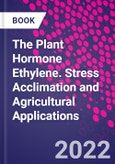The Plant Hormone Ethylene: Stress Acclimation and Agricultural Applications presents current knowledge on our understanding of ethylene perception and signaling, its role in the regulation of plant physiological processes, and its contribution to acclimation in stressful environments.
Plants regularly face environmental constraints due to their immobile nature. In persistently changing environmental conditions, several stress factors influence cellular metabolism, ultimately causing reduced plant growth and development with a significant loss in agricultural productivity. Sustainable agriculture depends on the acclimation of plant processes to the changing environment through altered physiological and molecular responses, which are controlled by plant hormones, including ethylene. Ethylene interacts with other plant hormones and signaling molecules to regulate several cellular processes, plant growth and development, and, ultimately, crop productivity.
This book begins with an introduction to ethylene before providing a detailed study of the latest findings on the role of ethylene in plants, including its role in photosynthetic processes, flower development, leaf senescence, nutrients acquisition, and regulation of abiotic stress responses as well as its application in agriculture. The book is an ideal guide for researchers exploring plant physiology and biochemistry as well as for those investigating the use of ethylene knowledge in agriculture in persistently changing environmental conditions.
Please Note: This is an On Demand product, delivery may take up to 11 working days after payment has been received.
Table of Contents
1. Ethylene: A small signaling molecule with diverse roles
2. Ethylene in Chloroplast Development and Photosynthetic Performance
3. Ethylene in Photosynthate Partitioning and Source-Sink Modulation in Agricultural Crops
4. Ethylene in the Regulation of Seed Dormancy and Germination: Molecular Mechanisms
5. Ethylene in the Regulation of Seed Dormancy and Germination: Biodiversity Matters
6. Ethylene as a plant ageing modulator
7. Ethylene in the Regulation of Major Biotechnological Processes
8. Ethylene in Horticulture Crops
9. Ethylene in Floriculture
10. Ethylene and cellular redox management in plant
11. Ethylene as a Modulator of Redox Reaction
12. Ethylene Interplay with Metabolites in Crops
13. Crosstalk between ethylene and mineral nutrients in regulation of morpho-physiological traits and nutrients homeostasis in plants
14. Ethylene in Abiotic Stress Tolerance in Crops
15. Ethylene and Biotic Stress in Crops








